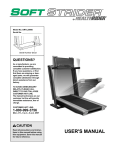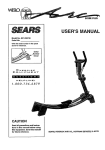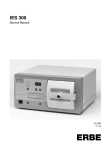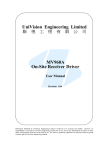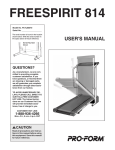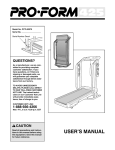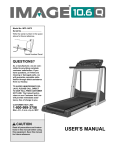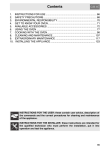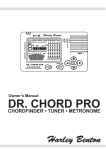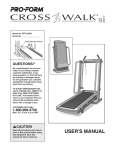Download HealthRider HRTL20001 User's Manual
Transcript
Model No. HRTL20001 Serial No. Serial Number Decal QUESTIONS? As a manufacturer, we are committed to providing complete customer satisfaction. If you have questions, or find that there are missing or damaged parts, we will guarantee complete satisfaction through direct assistance from our factory. TO AVOID UNNECESSARY DELAYS, PLEASE CALL DIRECT TO OUR TOLL-FREE CUSTOMER HOT LINE. The trained technicians on our customer hot line will provide immediate assistance, free of charge to you. CUSTOMER HOT LINE: 1-800-999-3756 Mon.–Fri., 6 a.m.– 6 p.m. MST CAUTION Read all precautions and instructions in this manual before using this equipment. Save this manual for future reference. USER'S MANUAL TABLE OF CONTENTS IMPORTANT PRECAUTIONS . . . . . . . . . . . . . . . . . . . . . . . . . . . . . . . . . . . . . . . . . . . . . . . . . . . . . . . . . . . . . . . . .3 BEFORE YOU BEGIN . . . . . . . . . . . . . . . . . . . . . . . . . . . . . . . . . . . . . . . . . . . . . . . . . . . . . . . . . . . . . . . . . . . . . . .4 ASSEMBLY . . . . . . . . . . . . . . . . . . . . . . . . . . . . . . . . . . . . . . . . . . . . . . . . . . . . . . . . . . . . . . . . . . . . . . . . . . . . . . .5 OPERATION AND ADJUSTMENT . . . . . . . . . . . . . . . . . . . . . . . . . . . . . . . . . . . . . . . . . . . . . . . . . . . . . . . . . . . . .7 HOW TO FOLD AND MOVE THE TREADMILL . . . . . . . . . . . . . . . . . . . . . . . . . . . . . . . . . . . . . . . . . . . . . . . . . .11 TROUBLE-SHOOTING . . . . . . . . . . . . . . . . . . . . . . . . . . . . . . . . . . . . . . . . . . . . . . . . . . . . . . . . . . . . . . . . . . . . .12 CONDITIONING GUIDELINES . . . . . . . . . . . . . . . . . . . . . . . . . . . . . . . . . . . . . . . . . . . . . . . . . . . . . . . . . . . . . . .14 ORDERING REPLACEMENT PARTS . . . . . . . . . . . . . . . . . . . . . . . . . . . . . . . . . . . . . . . . . . . . . . . . . .Back Cover LIMITED WARRANTY . . . . . . . . . . . . . . . . . . . . . . . . . . . . . . . . . . . . . . . . . . . . . . . . . . . . . . . . . . . . . . .Back Cover Note: An EXPLODED DRAWING and a PART LIST are attached to the center of this manual. Save the EXPLODED DRAWING and PART LIST for future reference. WARNING: Before beginning this or any exercise program, consult your physician. This is especially important for persons over the age of 35 or persons with pre-existing health problems. Read all instructions before using. HEALTHRIDER assumes no responsibility for personal injury or property damage sustained by or through the use of this product. 2 IMPORTANT PRECAUTIONS WARNING: To reduce the risk of burns, fire, electric shock, or injury to persons, read the following important precautions and information before operating the treadmill. 1. It is the responsibility of the owner to ensure that all users of this treadmill are adequately informed of all warnings and precautions. 2. Use the treadmill only as described in this manual. 3. Place the treadmill on a level surface, with eight feet of clearance behind it. Do not place the treadmill on any surface that blocks air openings. To protect the floor or carpet from damage, place a mat under the treadmill. 4. Keep the treadmill indoors, away from moisture and dust. Do not place the treadmill in a garage or covered patio, or near water. 5. Do not operate the treadmill where aerosol products are used or where oxygen is being administered. 6. Keep small children and pets away from the treadmill at all times. 7. The treadmill should be used only by persons weighing 250 pounds or less. Do not allow more than one person on the treadmill at a time. 8. When connecting the power cord (see HOW TO PLUG IN THE POWER CORD on page 7), plug the power cord into a surge protector (not included) and plug the surge protector into a grounded circuit capable of carrying 15 or more amps. No other appliance should be on the same circuit. 9. Use only a UL-listed surge protector, rated at 15 amps, with a 14-gauge cord of five feet or less in length. Do not use an extension cord. 10. Keep the power cord and the surge protector away from heated surfaces. 11. Never move the walking belt while the power is turned off. Do not operate the treadmill if the power cord or plug is damaged, or if the treadmill is not working properly. (See BEFORE YOU BEGIN on page 4 if the treadmill is not working properly.) 12. Wear appropriate clothing when using the treadmill; do not wear loose clothing that could become caught in the treadmill. Athletic support clothes are recommended for both men and women. Always wear athletic shoes; never use the treadmill with bare feet, wearing only stockings, or in sandals. 13. Never start the treadmill while you are standing on the walking belt. Always hold the handrails while using the treadmill. 14. The treadmill is capable of high speeds. Adjust the speed in small increments to avoid sudden jumps in speed. 15. To reduce the possibility of the treadmill overheating, do not operate the treadmill continuously for longer than 1 hour. 16. The pulse sensor is not a medical device. Various factors, including the user's movement, may affect the accuracy of heart rate readings. The pulse sensor is intended only as an exercise aid in determining heart rate trends in general. 17. Never leave the treadmill unattended while it is running. Always remove the key and move the on/off switch to the “off” position when the treadmill is not in use. (See the drawing on page 4 for the location of the on/off switch.) 18. You must be able to safely lift 45 pounds (20 kg) to raise, lower, or move the treadmill. 19. When storing or moving the treadmill, make sure that the storage latch is fully closed. 20. Never insert any object into any opening. 21. Inspect and tighten all parts of the treadmill every three months. 22. Always unplug the power cord before performing the maintenance and adjustment procedures described in this manual. Never remove the motor hood unless instructed to do so by an authorized service representative. Servicing other than the procedures in this manual should be performed by an authorized service representative only. SAVE THESE INSTRUCTIONS 3 BEFORE YOU BEGIN Thank you for selecting the HEALTHSTRIDER treadmill. The HEALTHSTRIDER treadmill combines advanced technology with innovative design to let you enjoy an excellent form of cardiovascular exercise in the convenience and privacy of your home. And when you’re not exercising, the unique HEALTHSTRIDER treadmill can be folded up, requiring less than half the floor space of other treadmills. please call our Customer Service Department toll-free at 1-800-999-3756, Monday through Friday, 6 a.m. until 6 p.m. Mountain Time (excluding holidays). To help us assist you, please note the product model number and serial number before calling. The model number of the treadmill is HRTL20001. The serial number can be found on a decal attached to the treadmill (see the front cover of this manual for the location). For your benefit, read this manual carefully before using the treadmill. If you have additional questions, Before reading further, please review the drawing below and familiarize yourself with the labeled parts. Towel Rack Water Bottle Holder* Storage Latch Speed Control Console Accessory Tray * Water Bottle is not included. Key/Clip Handrails On/Off Switch FRONT Circuit Breaker Foot Rails Walking Belt Power Cord RIGHT SIDE Cushioned Walking Platform for maximum exercise comfort Rear Roller Adjustment Bolt 4 BACK Incline Leg ASSEMBLY Assembly requires two people. Set the treadmill in a cleared area and remove all packing materials. Do not dispose of the packing materials until assembly is completed. Tools required for assembly: The included allen wrench and your phillips screwdriver and two adjustable wrenches . 1. Attach six Base Pads (73) to the bottom of the Base (75) in the indicated locations (see the inset drawing). Note: One additional Base Pad will be used in assembly step 6, and one extra Base Pad is included. 73 1 73 73 75 73 2. Firmly hold the Uprights (11, 58) as shown. Raise the Uprights until the Base (75) and the front Wheels (74) are resting on the floor. 2 11 58 74 75 3. Loosen the Crossbar Bolts (2) in the ends of the Console Crossbar (17). Pivot the Console (6) to the angle shown. Look under the Left and Right Crossbar Brackets (4, 51) and find the two small holes in each end of the Console Crossbar (17). Tighten Crossbar Screws (9) into all four holes. 3 6 2 4 9 Rotate the Console (6) upward until it stops. Using the 7/32” end of the Allen Wrench (56), tighten the Crossbar Bolts (2) in the ends of the Console Crossbar (17). 2 17 51 9 4. Next, the treadmill should be raised to the storage position. Hold the treadmill with your hands in the locations shown at the right. To decrease the possibility of injury, bend your legs and keep your back straight. As you raise the treadmill, make sure to lift with your legs rather than your back. Raise the treadmill about halfway to the vertical position. 56 4 5 5. Move your right hand to the position shown at the right, and hold the treadmill firmly. Using your left hand, lift the storage latch. Raise the treadmill until the locking pin snaps into the storage latch. Make sure that the locking pin is inside the storage latch, and that the storage latch is fully closed. 6. See drawing 6B. Attach a Base Pad (73) to the bottom of the Stabilizer Plate (88) in the indicated location. 5 Storage Latch Locking Pin 6B 6A 88 4 See drawing 6A. Stand behind the treadmill. Hold the Left Crossbar Bracket (4) and the Right Crossbar Bracket (not shown). Place one foot on the Base (75) in the indicated location.Tip the treadmill back slightly. While the treadmill is held in this position, a second person should slide the Stabilizer Plate (88) onto the Base (see drawing 6C). Keeping your foot on the Base, carefully tip the treadmill up until it is resting on the Base. Make sure that the Stabilizer Plate (88) stays on the Base. 73 88 See drawing 6C. Attach the Stabilizer Plate (88) to the Base (75) with a Stabilizer Plate Bolt (105), two Washers (97), and the Stabilizer Plate Nut (95) as shown. 75 Before moving the treadmill, see HOW TO MOVE THE TREADMILL on page 11. 6C 95 97 105 75 7. Refer to assembly drawing 5 at the top of this page. Hold the upper end of the treadmill with your right hand as shown. Using your left hand, lift the storage latch. Pivot the treadmill slightly until the locking pin is out of the storage latch. 7 Hold the treadmill firmly with both hands, and lower the treadmill to the floor. To decrease the possibility of injury, bend your legs and keep your back straight. 8. Remove the paper backing from the Adhesive Clip (44). Press the Adhesive Clip onto the Frame (84) in the indicated location. Press the Allen Wrench (57) into the Adhesive Clip. The use of the Allen Wrench is described on page 13. Make sure that all parts are tightened before you use the treadmill. Note: Place a mat beneath the treadmill to protect the floor or carpet. 6 8 44 57 84 88 OPERATION AND ADJUSTMENT THE PERFORMANT LUBETM WALKING BELT Your treadmill features a walking belt coated with PERFORMANT LUBETM, a high-performance lubricant. IMPORTANT: Never apply silicone spray or other substances to the walking belt or the walking platform. They will deteriorate the walking belt and cause excessive wear. HOW TO PLUG IN THE POWER CORD DANGER: Improper connection of the equipment-grounding conductor can result in an increased risk of electric shock. Check with a qualified electrician or serviceman if you are in doubt as to whether the product is properly grounded. Do not modify the plug provided with the product—if it will not fit the outlet, have a proper outlet installed by a qualified electrician. electric shock. This product is equipped with a cord having an equipment-grounding conductor and a grounding plug. Plug the power cord into a surge protector, and plug the surge protector into an appropriate outlet that is properly installed and grounded in accordance with all local codes and ordinances. This product is for use on a nominal 120-volt circuit, and has a grounding plug that looks like the plug illustrated in drawing 1 below. A temporary adapter that looks like the adapter illustrated in drawing 2 may be used to connect the surge protector to a 2-pole receptacle as shown in drawing 2 if a properly grounded outlet is not available. The temporary adapter should be used only until a properly grounded outlet (drawing 1) can be installed by a qualified electrician. The green-colored rigid ear, lug, or the like extending from the adapter must be connected to a permanent ground such as a properly grounded outlet box cover. Whenever the adapter is used it must be held in place by a metal screw. Some 2-pole receptacle outlet box covers are not grounded. Contact a qualified electrician to determine if the outlet box cover is grounded before using an adapter. Your treadmill, like any other type of sophisticated electronic equipment, can be seriously damaged by sudden voltage changes in your home’s power. Voltage surges, spikes, and noise interference can result from weather conditions or from other appliances being turned on or off. To decrease the pos1 sibility of your treadGrounded Outlet Box mill being damaged, Treadmill Power Cord always use a surge Grounding Pin protector (not included) with your Grounding Plug Grounding Plug treadmill. Surge protectors are sold at most hardware stores and department stores. Use only a ULlisted surge protector, rated at 15 amps, with a 14-gauge cord of five feet or less in length. This product must be grounded. If it should malfunction or break down, grounding provides a path of least resistance for electric current to reduce the risk of Grounding Pin Grounded Outlet 2 Grounded Outlet Box Adapter Grounding Pin Grounding Plug Surge Protector Lug Metal Screw 7 DIAGRAM OF THE CONSOLE Mode Indicators Warm -up Performance FAST CAL. / FAT CAL. Cool -down TIME A SPEED PROFILES FAT B Aerobic C DIST. / PULSE SPEED D Fat Burn KPH E F Warm-Up & Cool-Down 30 28 26 24 22 20 18 16 14 12 10 8 6 4 2 INCLINE Mins. MANUAL SLOW ON THUMB PULSE OFF 1 INSERT KEY RESET/ PAUSE 2 3 RESET / SET SPEED Key SELECT MODE 4 START / STOP Speed Control Note: If there is a thin sheet of clear plastic on the face of the console, remove it. Clip CAUTION: Before operating the console, read the following precautions. • Do not stand on the walking belt when turning on the power. • Always wear the clip (see the drawing above) while operating the treadmill. If the key is in the console, remove it. Make sure that the power cord is properly plugged in. (See HOW TO PLUG IN THE POWER CORD on page 7.) Next, step onto the foot rails of the treadmill. Find the clip attached to the key (see the drawing above), and slide the clip onto the waistband of your clothing. Follow the steps below to operate the console: 1 • Adjust the speed in small increments. • To reduce the possibility of electric shock, keep the console dry. Avoid spilling liquids on the console, and use only a sealed water bottle. Insert the key fully into the power switch. The four displays and the green MANUAL mode indicator will light. • The training zones marked beside the speed control are general guidelines only. See CONDITIONING GUIDELINES on page 14. 2 ON OFF 1 INSERT KEY Reset the speed control and select a speed setting. STEP-BY-STEP CONSOLE OPERATION The treadmill console features a manual mode and six preset workout programs. In the manual mode, the speed of the walking belt can be changed with the electronic speed control. When one of the workout programs is selected, the console will automatically control the speed as it guides you through an effective workout. 8 Before operating the console, make sure that the on/off switch near the power cord is in the “on” position. “On” Position OFF ON Slide the speed control down to the "RESET" position. Note: Each time the walking belt is stopped, the speed control must be moved to the “RESET” position before the walking belt can be restarted. Next, slide the speed control upward to select a speed setting. Note: If the key was just inserted, the walking belt will not begin to move yet. mance FAST c rn Up & own SLOW ESET/ AUSE 2 RESET / SET SPEED 3 Press the SELECT MODE button to select the desired mode. control is set, the greater the speed range will be and the faster the walking belt will move during the program. If the program is too easy or too difficult, adjust the speed control to select a new maximum speed setting. To stop the program temporarily, slide the speed control to the “RESET” position. The SPEED display will begin to flash. To restart the program, slide the speed control up to the desired position. To end the program before the program is completed, press the START/STOP button. If you select a different program while a program is running, the walking belt will slow to a stop. When the key is inserted, the console will be in the MANUAL mode. The MANUAL mode can also be selected by repeatedly pressing the SELECT MODE button. If you want to select one of the six preset programs, press the SELECT SELECT MODE butMODE ton. The red PROGRAM A indicator will light. To select PROGRAM B, C, D, E, or F, repeatedly press the SELECT MODE button. 3 4 Note: PROGRAMS A, B, and C are twenty-minute programs; PROGRAMS D, E, and F are thirtyminute programs. The speed profiles in the center of the console show how the speed of the walking belt will change during the programs. During PROGRAM A, for example, the speed will gradually increase during the first ten minutes, and then gradually decrease during the last ten minutes. Each program will begin with a two-minute warm-up period, and end with a two-minute cool-down period. 4 Press the START/STOP button. After the START/STOP button is pressed, the ECT START walking belt will E / STOP begin to move. Hold the handrails and carefully begin walking on the walking belt. 4 If the console is in the manual mode, change the speed of the walking belt as desired by sliding the speed control. To stop the walking belt, slide the speed control to the “RESET” position. The SPEED display will begin to flash. To restart the walking belt, slide the speed control upward. Note: The walking belt can also be stopped by pressing the START/ STOP button; however, this will reset the displays. To restart the walking belt, slide the speed control to the “RESET” position, slide it upward, and then press the START/STOP button. |f one of the preset programs is selected, the speed of the walking belt will change automatically during the program as shown by the speed profiles in the center of the console. The time remaining in the program will be shown in the TIME display. When the program is completed, the walking belt will slow to a stop. Note: The position of the speed control determines both the speed range and the maximum speed setting for the program. The higher the speed 5 Follow your progress with the monitor displays. The four monitor displays provide instant exercise feedback. The displays are explained below and on the next page. • CAL/FAT CAL disCAL. / FAT CAL. TIME play—Displays the FAT numbers of both Calories and Fat Calories you have burned (see BURNING FAT on page 14). Every seven seconds, the display will change from one number to the other. The FAT indicator will light when the number of Fat Calories is shown. Note: The actual number of Calories you have burned may differ slightly from the number shown if the speed or incline is near the lowest or highest setting. • TIME display— TIME When the console is in the manual mode, the elapsed time will be shown. When one of the preset programs is selected, the time remaining in the program will be displayed. • SPEED display— SPEED Displays the speed of the walking belt, KPH in miles per hour or kilometers per hour. The KPH indicator will light when the speed is displayed in kilometers per hour. Note: To change the unit of measurement, hold down the START/STOP button while inserting the key into the console. An “E” (for English system— miles per hour) or “M” (for Metric system—kilometers per hour) will appear in the CAL/FAT CAL display. Press the SELECT MODE button to change the setting. Remove and then reinsert the key. 9 • DISTANCE/PULSE DIST. / PULSE display—Displays the distance you have walked or run. Note: If the KPH indicator beside the SPEED display is lit, the distance will be displayed in kilometers. If the indicator is not lit, the distance will be displayed in miles. The DISTANCE/PULSE display also shows your pulse when the pulse sensor is used (see step 6). 6 Measure your pulse, if desired. To use the pulse sensor, stand on the foot rails and place your thumb on the pulse sensor as shown. The pulse sensor is Pulse pressure-acSensor tivated. Fully press down the pulse sensor. Do not press too hard, or the circulation in your thumb will be restricted, and your pulse will not be detected. Next, slightly raise your thumb until the heart-shaped indicator beside the DISTANCE/ PULSE display flashes steadily. Hold your thumb at this level. After 5 to 10 seconds, your pulse will be displayed. Hold your thumb on the sensor for another 15 seconds for the most accurate reading. If the displayed pulse appears to be too high or too low, or if your pulse is not displayed, lift your thumb off the sensor and allow the display to reset. Press down again on the sensor as described above. Make sure that your thumb is positioned as shown, and that you are applying the proper amount of pressure to the pulse sensor. Try the sensor several times until you become familiar with it. Remember to stand still while measuring your pulse. 10 7 Change the incline of the treadmill, if desired. To change the incline, hold down one of the incline buttons until the desired incline is reached. 8 L INCLINE When you are finished, remove the key. 1 KEY Step onto the foot rails and remove the key from the console. Store the key in a secure place. In addition, move the on/off switch to the “off” position. (See the drawing near the bottom of page 8.) THE INFORMATION MODE The console features an information mode that keeps track of the total time and distance accumulated on the treadmill. To access this mode, hold down the START/ STOP button while inserting the key into the console. The TIME display will show the total time. The DISTANCE/PULSE display will show the total distance (if the total distance exceeds 999, the thousands and ten thousands digits will be shown in the SPEED display). The CAL/FAT CAL display will show an “E” or an “M,” indicating miles or kilometers (see SPEED DISPLAY on page 9). To exit the information mode, remove the key from the console. HOW TO FOLD AND MOVE THE TREADMILL HOW TO FOLD THE TREADMILL FOR STORAGE Before folding the treadmill, unplug the power cord. Caution: You must be able to safely lift 45 pounds (20 kg) in order to raise, lower, or move the treadmill. 1. Hold the treadmill with your hands in the locations shown at the right. To decrease the possibility of injury, bend your legs and keep your back straight. As you raise the treadmill, make sure to lift with your legs rather than your back. Raise the treadmill about halfway to the vertical position. 2. Move your right hand to the position shown at the right, and hold the treadmill firmly. Using your left hand, lift the storage latch. Raise the treadmill until the locking pin snaps into the storage latch. Make sure that the locking pin is inside the storage latch, and that the storage latch is fully closed. Storage Latch Locking Pin To protect the floor or carpet from damage, place a mat under the treadmill. Keep the treadmill out of direct sunlight. Do not leave the treadmill in the storage position in temperatures above 85° Fahrenheit. HOW TO MOVE THE TREADMILL Crossbar Bracket Before moving the treadmill, convert the treadmill to the storage position as described above. Make sure that the locking pin is inside the storage latch, and that the storage latch is fully closed. 1. Hold one crossbar bracket with each hand. Place one foot on the base as shown. 2. Tilt the treadmill back until it rolls freely on the front wheels. Carefully move the treadmill to the desired location. Never move the treadmill without tipping it back, or the base pads may come off. To reduce the risk of injury, use extreme caution while moving the treadmill. Do not attempt to move the treadmill over an uneven surface. Base 3. Place one foot on the base, and carefully lower the treadmill until it is resting in the storage position. Front Wheels HOW TO LOWER THE TREADMILL FOR USE 1. Hold the upper end of the treadmill with your right hand as shown. Using your left hand, lift the storage latch. Pivot the treadmill slightly until the locking pin is out of the storage latch. Storage Latch Locking Pin 11 2. Hold the treadmill firmly with both hands, and lower the treadmill to the floor. To decrease the possibility of injury, bend your legs and keep your back straight. TROUBLE-SHOOTING Most treadmill problems can be solved by following the steps below. Find the symptom that applies, and follow the steps listed. If further assistance is needed, please call our Customer Service Department tollfree at 1-800-999-3756, Monday through Friday, 6 a.m. until 6 p.m. Mountain Time (excluding holidays). 1. SYMPTOM: THE POWER DOES NOT TURN ON a. Make sure that the power cord is plugged into a surge protector, and that the surge protector is plugged into a properly grounded outlet. (See HOW TO PLUG IN THE POWER CORD on page 7.) Use only a UL-listed surge protector, rated at 15 amps, with a 14-gauge cord of five feet or less in length. b. After the power cord has been plugged in, make sure that the key is fully inserted into the console. (See step 1 on page 8.) c. Check the circuit breaker located on the treadmill near the power cord. If the switch protrudes as shown, the circuit breaker has tripped. To reset the circuit breaker, wait for five minutes and then press the switch back in. Tripped Reset Tripped d. Check the on/off switch located at the front of the treadmill near the power cord. The switch must be in the “on” position. “On” Position Reset OFF ON 2. SYMPTOM: THE POWER TURNS OFF DURING USE a. Check the circuit breaker located on the treadmill frame near the power cord (see 1. c. above). If the circuit breaker has tripped, wait for five minutes and then press the switch back in. b. Make sure that the power cord is plugged in. c. Remove the key from the console. Reinsert the key fully into the console. (See step 1 on page 8.) d. Check to make sure that the on/off switch is in the “on” position. (See 1. d. above.) 12 e. If the treadmill still will not run, please call our Customer Service Department, toll-free. 3. SYMPTOM: THE WALKING BELT SLOWS WHEN WALKED ON a. Use only a UL-listed surge protector, rated at 15 amps, with a 14-gauge cord of five feet or less in length. b. If the walking belt still slows when walked on, please call our Customer Service Department, toll-free. 4. SYMPTOM: THE WALKING BELT IS OFF-CENTER WHEN WALKED ON a. If the walking belt has shifted to the left, first remove the key and UNPLUG THE POWER CORD. Using the 3/16” end of the allen wrench, turn the left rear roller adjustment bolt clockwise 1/4 of a turn. Plug in the power cord, insert the key and run the treadmill for a few minutes. Repeat until the walking belt is centered. b. If the walking belt has shifted to the right, first remove the key and UNPLUG THE POWER CORD. Using the 3/16” end of the allen wrench, turn the left rear roller adjustment bolt counterclockwise 1/4 of a turn. Plug in the power cord, insert the key and run the treadmill for a few minutes. Repeat until the walking belt is centered. a b 5. SYMPTOM: THE TREADMILL SITS UNEVENLY ON THE FLOOR a. Make sure that the two base pads and the stabilizer pad are attached to the treadmill (see assembly steps 1 and 6 on pages 5 and 6). 13 CONDITIONING GUIDELINES WARNING: Before beginning this or any exercise program, consult your physician. This is especially important for individuals over the age of 35 or individuals with pre-existing health problems. AGE Unconditioned Conditioned 20 138-167 133-162 25 136-166 132-160 The pulse sensor is not a medical device. Various factors, including your movement, may affect the accuracy of heart rate readings. The sensor is intended only as an exercise aid in determining heart rate trends in general. 30 135-164 130-158 35 134-162 129-156 40 132-161 127-155 45 131-159 125-153 50 129-156 124-150 The following guidelines will help you to plan your exercise program. Remember—these are general guidelines. For more detailed information about exercise, obtain a reputable book or consult your physician. 55 127-155 122-149 60 126-153 121-147 65 125-151 119-145 EXERCISE INTENSITY 70 123-150 118-144 75 122-147 117-142 80 120-146 115-140 85 118-144 114-139 Whether you want to burn fat, strengthen your cardiovascular system, or increase your athletic performance, you can tailor your exercise to your specific goals. The key to achieving the desired results is to exercise with the proper intensity. Burning Fat To burn fat effectively, you must exercise at a relatively low intensity level for a sustained period of time. During the first few minutes of exercise, your body uses easily accessible carbohydrate calories for energy. Only after the first few minutes of exercise does your body begin to use stored fat calories for energy. If your goal is to burn fat, set the speed control on the console to FAT BURN to help you maintain the proper intensity level. (See pages 8 and 9.) Aerobic Exercise If your goal is to strengthen your cardiovascular system, your exercise must be “aerobic.” Aerobic exercise is activity that requires large amounts of oxygen for prolonged periods of time. This increases the demand on the heart to pump blood to the muscles, and on the lungs to oxygenate the blood. The proper intensity level for aerobic exercise can be found by using your pulse as a guide. As you exercise, your pulse should be kept at a level between 70% and 85% of your maximum possible heart rate. This is known as your training zone. You can find your training zone in the table at the top of this page. Training zones are listed according to age and physical condition. 14 TRAINING ZONE (Beats/Min.) During the first few months of your exercise program, keep your pulse near the low end of your training zone as you exercise. After a few months of regular exercise, your pulse can be gradually increased until it is near the middle of your training zone as you exercise. You can measure your pulse using the pulse sensor. Exercise for about four minutes, and then measure your pulse immediately. If your pulse is too high or too low, adjust the intensity of your exercise. It may also be helpful to set the speed control on the console to AEROBIC to help you maintain the proper intensity level. (See pages 8 and 9.) Performance Training If your goal is high performance athletic conditioning, set the speed control on the console to PERFORMANCE to help you maintain the proper intensity level. (See pages 8 and 9.) WORKOUT GUIDELINES Each workout should include three parts: (1) a warmup, (2) training zone exercise, and (3) a cool-down. Warm-up Warming up prepares the body for exercise by increasing circulation, delivering more oxygen to the muscles and raising the body temperature. Begin each workout with 5 to 10 minutes of stretching and light exercise to warm up (see SUGGESTED STRETCHES on page 15). Training Zone Exercise After warming up, increase the intensity of your exercise until your pulse is in your training zone for 20 to 60 minutes. (During the first few weeks of your exercise program, do not keep your pulse in your training zone for longer than 20 minutes.) Breathe regularly and deeply as you exercise—never hold your breath. to cool down. This will increase the flexibility of your muscles and will help to prevent post-exercise problems. Exercise Frequency To maintain or improve your condition, complete three workouts each week, with at least one day of rest between workouts. After a few months, you may complete up to five workouts each week if desired. Cool-down Finish each workout with 5 to 10 minutes of stretching The key to success is to make exercise a regular and enjoyable part of your everyday life. SUGGESTED STRETCHES The correct form for several basic stretches is shown in the drawings below. Move slowly as you stretch—never bounce. 1 1. Toe Touch Stretch Stand with your knees bent slightly and slowly bend forward from your hips. Allow your back and shoulders to relax as you reach down toward your toes as far as possible. Hold for 15 counts, then relax. Repeat 3 times. Stretches: Hamstrings, back of knees and back. 2 2. Hamstring Stretch Sit with one leg extended. Bring the sole of the opposite foot toward you and rest it against the inner thigh of your extended leg. Reach toward your toes as far as possible. Hold for 15 counts, then relax. Repeat 3 times for both legs. Stretches: Hamstrings, lower back and groin. 3 3. Calf/Achilles Stretch With one leg in front of the other, reach forward and place your hands against a wall. Keep your back leg straight and your back foot flat on the floor. Bend your front leg, lean forward and move your hips toward the wall. Hold for 15 counts, then relax. Repeat 3 times for both legs. To cause further stretching of the achilles tendons, bend your back leg as well. Stretches: Calves, achilles tendons and ankles. 4 4. Quadriceps Stretch With one hand against a wall for balance, reach back and grasp one foot with your other hand. Bring your heel as close to your buttocks as possible. Hold for 15 counts, then relax. Repeat 3 times for both legs. Stretches: Quadriceps and hip muscles. 5 5. Inner Thigh Stretch Sit with the soles of your feet together and your knees outward. Pull your feet toward your groin area as far as possible. Hold for 15 counts, then relax. Repeat 3 times. Stretches: Quadriceps and hip muscles. 15 ORDERING REPLACEMENT PARTS To order replacement parts, call our Customer Service Department toll-free at 1-800-999-3756, Monday through Friday, 6 a.m. until 6 p.m. Mountain Time (excluding holidays). When ordering parts, please be prepared to give the following information: • The MODEL NUMBER OF THE PRODUCT (HRTL20001). • The NAME OF THE PRODUCT (HEALTHSTRIDER Treadmill). • The SERIAL NUMBER OF THE PRODUCT (see the front cover of this manual). • The KEY NUMBER OF THE PART(S) (see the EXPLODED DRAWING and PART LIST attached to the center of this manual). • The DESCRIPTION OF THE PART(S) (see the EXPLODED DRAWING and PART LIST attached to the center of this manual). If possible, place the treadmill near your telephone for easy reference when calling. LIMITED WARRANTY HEALTHRIDER Acquisition Corp., Inc. (HEALTHRIDER), warrants this product to be free from defects in workmanship and material, under normal use and service conditions, for a period of ninety (90) days from the date of purchase. This warranty extends only to the original purchaser. HEALTHRIDER’s obligation under this warranty is limited to replacing or repairing, at HEALTHRIDER’s option, the product at one of its authorized service centers. All products for which warranty claim is made must be received by HEALTHRIDER at one of its authorized service centers with all freight and other transportation charges prepaid, accompanied by sufficient proof of purchase. All returns must be pre-authorized by HEALTHRIDER. This warranty does not extend to any product or damage to a product caused by or attributable to freight damage, abuse, misuse, improper or abnormal usage or repairs not provided by an HEALTHRIDER authorized service center, to products used for commercial or rental purposes, or to products used as store display models. No other warranty beyond that specifically set forth above is authorized by HEALTHRIDER. HEALTHRIDER is not responsible or liable for indirect, special or consequential damages arising out of or in connection with the use or performance of the product or damages with respect to any economic loss, loss of property, loss of revenues or profits, loss of enjoyment or use, costs of removal, installation or other consequential damages of whatsoever nature. Some states do not allow the exclusion or limitation of incidental or consequential damages. Accordingly, the above limitation may not apply to you. The warranty extended hereunder is in lieu of any and all other warranties and any implied warranties of merchantability or fitness for a particular purpose is limited in its scope and duration to the terms set forth herein. Some states do not allow limitations on how long an implied warranty lasts. Accordingly, the above limitation may not apply to you. This warranty gives you specific legal rights. You may also have other rights which vary from state to state. HEALTHRIDER Acquisition Corp., Inc., 1500 S. 1000 W., LOGAN, UT 84321-9813 Part No. 133039 F02855-C R0896A Printed in USA © 1996 HEALTHRIDER Acquisition Corp., Inc. REMOVETHIS THIS EXPLODED PART LIST/EXPLODED REMOVE DRAWING FROM THE MANUAL! ANDDRAWING PART LIST FROM THE MANUAL 34 Save this EXPLODED DRAWING and PART LIST for future reference. Note: Specifications are subject to change without notice. For information about ordering replacement parts, see the back cover of the User’s Manual. PART LIST—Model No. HRTL20001 Key No. Qty. 1 2 3 4* 5 6* 7 8 9 10 11 12 13 14 15 16 17 18 19* 20 21 22 23 24 25 26 27 28 29 30 31 32 33 34 35 36 37 38 39 40 41 42 43 44 45 46 47 48 49 50 51 52 53 54 55 56 57 58 8 2 2 1 1 1 8 2 4 8 1 1 1 1 1 2 1 2 1 1 1 1 1 1 1 6 7 1 1 2 2 1 8 1 1 4 4 1 1 2 2 1 1 2 17 4 1 1 1 1 1 1 1 1 5 1 1 1 Description Crossbar Bracket Screw Crossbar Bolt Crossbar Washer Left Crossbar Bracket Ground Wire Screw Console Console Screw Wire Harness Grommet Crossbar Screw Cage Nut Left Upright Electronics Decal Key/Clip Spring Sleeve Upright Wire Harness Incline Leg Washer Console Crossbar Crossbar Bracket Motor/Pulley/Flywheel/Fan Motor Pulley/Flywheel/Fan Water Bottle Holder Insert Potentiometer Speed Knob Motor Belt Nut Motor Tension Bolt/Upright Bolt Motor Tension Washer Storage Latch Motor Bolt Upright Washer Front Hood Hood Anchor Screw Motor Tension Nut Motor Mount Bracket Rubber Hood Anchor Metal Hood Anchor Front Hood Spacer Motor Swivel Bolt Motor Nut Incline Wheel Nut Latch Decal Magnet Adhesive Clip Screw Wire Clip On/Off Switch Electronics Bracket Controller Choke Right Crossbar Bracket Bracket Latch Pin Circuit Breaker Front Roller Adjustment Bolt Adjustment Washer Incline Motor Spacer Allen Wrench Right Upright R0896A Key No. Qty. 59 60 61 62 63 64 65 66 67 68 69 70 71 72 73 74 75 76 77 78 79 80 81 82 83 84 85 86 87 88 89 90 91 92 93 94 95 96 97 98 99 100 101 102 103 104 105 # # # # # # # 1 2 1 1 1 5 2 2 1 2 2 4 4 1 8 4 1 1 4 2 1 1 30 1 2 1 1 8 2 1 4 1 1 1 8 1 1 1 2 1 1 1 2 1 1 1 1 1 1 1 1 1 1 1 Description Power Supply w/Clips Incline Leg Wheel Bolt Right Rear Roller Adj. Bolt Incline Leg Rear Hood Spacer 8” Wire Tie Upright Pivot Nut Tie Holder Clamp Rear Hood Cotter Pin Upright Pivot Bolt Front Wheel Bolt/Incline Leg Bolt Wheel Spacer Upright Plug Base Pad Wheel Base Motor/Controller Wire Plastic Stand-Off Foot Rail Power Cord Grommet Safety Cover Screw Safety Cover Hairpin Cotter Pin Frame Base Shock Isolator Belt Guide Stabilizer Plate Roller Guard Front Roller/Pulley Walking Platform Walking Belt Platform Screw Left Rear Roller Adj. Bolt Stabilizer Plate Nut Tension Spring Washer Incline Motor Incline Rod Incline Rod Bolt Guard Spring Roller Tension Nut Rear Roller Guard Rear Roller Stabilizer Plate Bolt 14” Blue Wire, 2 Female 14” White Wire, 2 Female 4” Blue Wire, 2 Female 8” White Wire, Male/Female 8” Green Wire, Ring/Female 4” Black Wire, 2 Female User’s Manual * Includes all parts shown in the box # These parts are not illustrated 69 27 66 45 85 64 81 33 1 2 3 52 1 37 31 72 11 29 4* 67 10 63 81 13 9 6* 57 7 37 7 33 44 15 36 81 74 7 17 60 78 61 42 101 55 94 7 5 24 EXPLODED DRAWING—Model No. HRTL20001 23 41 103 86 93 10 9 22 89 18 7 26 41 101 96 19* 21 55 104 89 7 62 12 25 R0896A 14 83 26 60 107 40 74 29 93 28 55 102 20 26 27 30 70 78 91 81 89 99 16 92 83 43 35 34 26 90 38 32 56 68 65 45 37 84 39 100 98 44 36 33 105 73 73 88 97 46 45 81 87 89 36 37 82 81 10 45 10 8 80 53 45 71 54 95 97 74 75 71 70 31 73 47 81 49 48 33 81 73 26 79 45 27 55 45 77 59 76 1 69 26 71 8 58 1 51 45 3 15 2 27 74 71 70 73 50



















